Software Development Outsourcing: A Complete Guide

Outsourcing has become a popular business practice in recent years. And for good reason!
Outsourcing software development can help businesses cut costs, increase efficiency, and speed up the time to market.
There are many different advantages to outsourcing your software development. Outsourcing software development can be a cost-effective option for companies of any size and budget, and it also serves as a great way to access experts in the field.
Software developers who work remotely can save you time and money by doing most or all of the work from their homes. But there are many misconceptions about this industry. Some people think that outsourcing is only for large businesses, or that it’s too expensive for small businesses.
But the truth is outsourcing is available to any company of any size, and even starting with a few freelancers can be affordable.
This blog is going to teach you everything you need to know about outsourcing software development. From why it’s important to learn about outsourcing before hiring a developer, to how best to manage your project, this article will give you all the tools needed for success.
What is Outsourced Software Product Development?
Outsourcing software development – or “outsourcing anything” – has become a very popular practice among companies that often cannot keep up with their growth.
Outsourcing allows you to get work done on your terms. If your internal resources are stretched too thin or have too many items on their plates, outsourcing can be the ideal solution to free up time for them so they’ll have more bandwidth to focus on solving important challenges.
Also Read | What Does A Software Engineer Do?
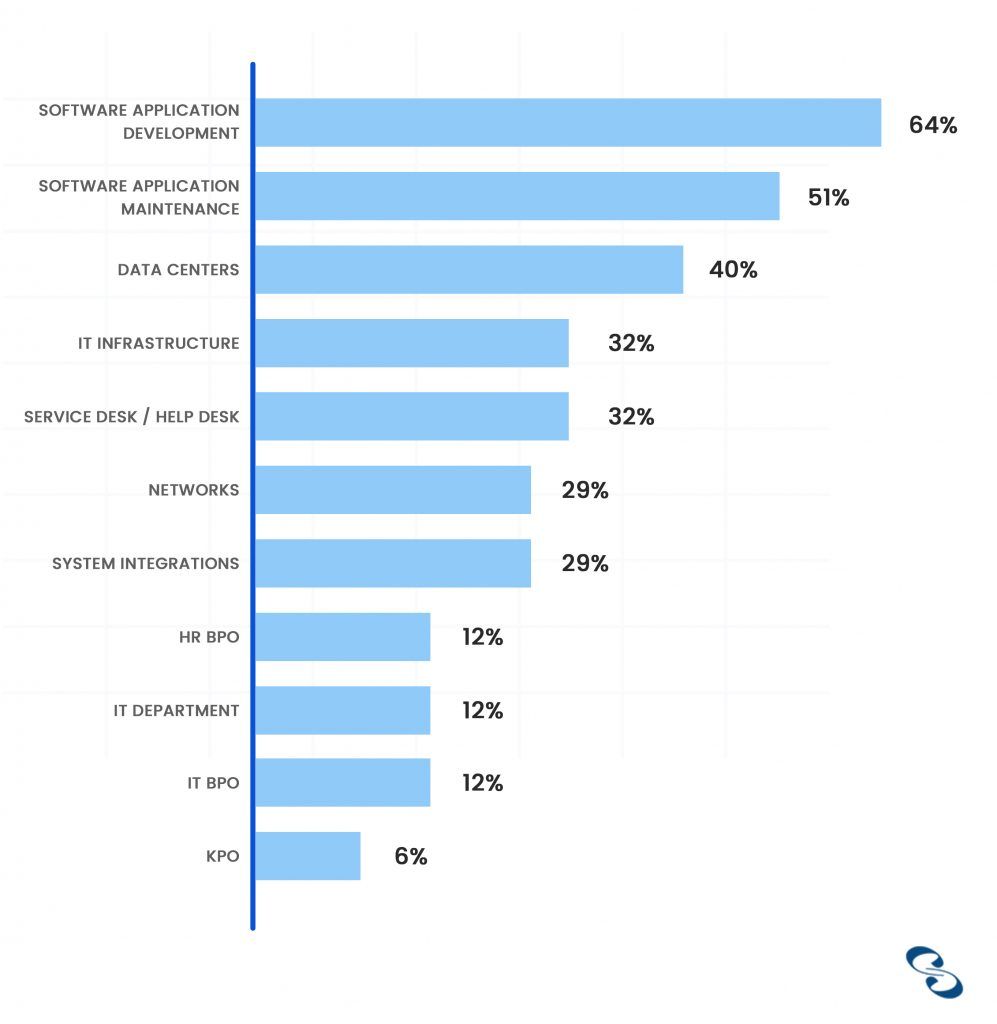
So why is it so important and vital for software and app consumer businesses to outsource their development needs? For starters, outsourcing offers a comprehensive selection of programming languages that only matches the best developers.
It also offers you background knowledge about current technology and tools, because your software developer outsourced should already be acquainted with the newest practices.
If you’re looking to upgrade your product and want to outsource some functions, you’re in luck! Read on as we discuss the benefits of outsourcing software product development and how it can speed up the development of new software.
Outsourcing different aspects of product development, whether that means all of the design, features, or testing of your product can be a great buy for startups!
Why Should Your Startup Outsource Software Development?
Getting started on your software development project can be really difficult — you need to figure out the type of application you should build, which language is best for your business needs, and how best to handle the entire development process.
Software development is a strategic investment in a business’ Marketing And Product Development, but small- to medium-sized companies don’t always have the resources to develop their own software from scratch.
Did you know– Outsourcing involves the direct hiring of self-employed developers, often from India or South America, who remotely work on-site for your company? And because it implies contract agreements and the transfer of intellectual property rights, this arrangement is usually contractual.
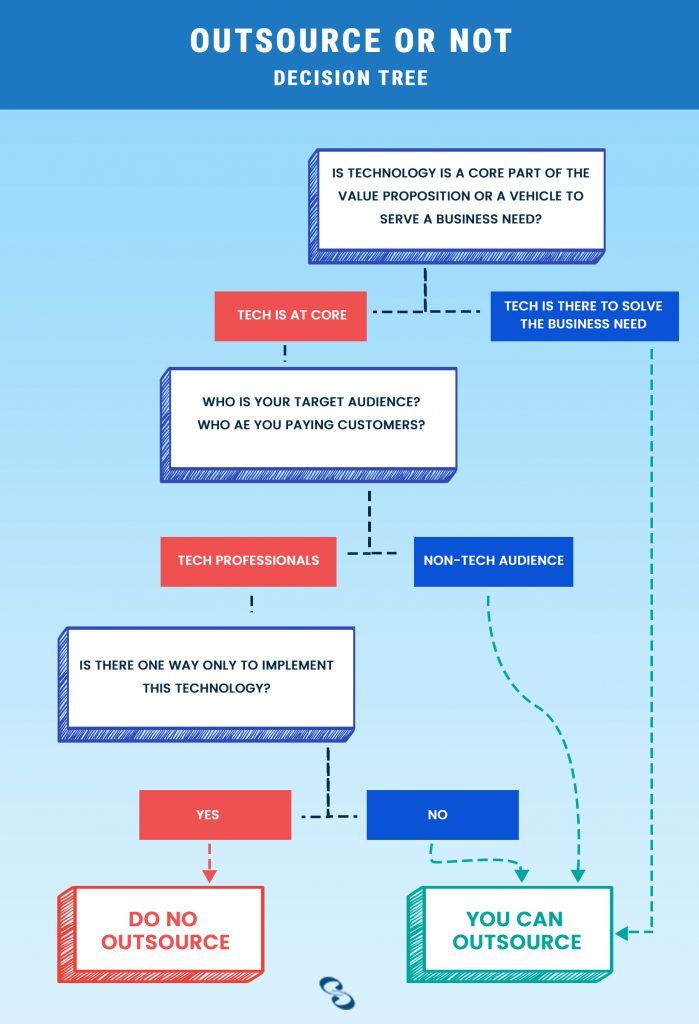
Startups don’t all follow the same path, but one that’s popular is the “shoot for free, pivot if it doesn’t work” strategy. When you’re looking at fewer than six months of runway before losing all the looser funding to keep your company running, you need to make tough choices about what’s worth pursuing.
Also Read | front-end web developer
Take it from startup founders who’ve seen success in this arena – there are certain instances where outsourcing software development projects is absolutely worth your investment. These were some of the benefits they received from outsourcing :
- Contact with experts
- Reach for in-depth knowledge and practical experiences
- Optimal equilibrium between abilities and rates
- Capacity to accumulate the best proficient group for the projects
- No requirement for micromanagement
- Viable communication inside the group
- Use of the Agile procedure
- Deriving the process with scalability
The decision to outsource your software development can have a huge impact on whether or not your product will be successful.
While outsourcing has always been a go-to for companies that would usually be too small or inexperienced to do development in-house, the technology boom of the last decade marks outsourcing as an excellent option for established, successful startups.
Cons of Software Development Outsourcing
Language is more than just an alphabet with rules on how to put letters together. It can be used as a tool to create meaning, understanding, and connection. With the more advanced technological advancements of this day in age, are we losing meaning by letting our meaning be translated for us?
Outsourcing software development is a great way to save time, but it does have some major drawbacks that should be taken into account before making a decision.
Outsourcing software development can be helpful when you need a quality product, but it’s not the be-all-end-all solution. Outsourced Developers might have different levels of experience or knowledge in your industry, making it difficult to work with them in the long run.

Outsourcing offers you a tremendous opportunity to hire only the Best developers for your work onshore or offshore. Delegating some of your business processes or activities to an outside service provider seems like a good idea given the prospect of finding a super understandable team with low fees, amazing quality, and technical expertise.
However, we need to shed some light on some of the downsides of the entire outsourcing process and how it can negatively impact your business.
- It is important to consider time zones and language differences when looking for a third-party development company. These two things can be one of the biggest obstacles to getting a project done. A huge difference in time zones can ruin the whole communication process.
- Something is lost during translation. Outsourcing work with foreign companies by phone or e-mail can lead to a loss of translation results. Outsourcing can run into issues in case there is a social irregularity with the collaborated organization and additionally, the development group isn’t conversant in English.
- If the software outsourcing company cannot effectively manage and collaborate on the project, their daily work may require strict management from you, which will distract you from your core business. Putting others in the “trouble” of creating software implies you can focus on other different things: content, advertising, dissemination, administration, and many other useful things that might need your time. You can also devote yourself to the future, that is, to develop key strategic business areas.
Also Read | Data Analyst Vs Data Scientist
Making development easy, the process more logical, and collaboration more efficient with the best experts in their field are not the primary benefits of outsourcing today. But we do agree with the fact that there are a few upsides and downsides of developing software through outsourcing that the developing group faces while they outsource.
Obviously, when partnering with another company, there can be problems with outsourcing software. Even if such problems arise, they will not affect your business process. If the company is not familiar with outsourcing, this issue can arise in the process.
However, companies also need to pay attention to some of the disadvantages of outsourcing. And this is usually the case if you are aware of the benefits of outsourcing in general.
The downside to these benefits is that software outsourcing can also work against core business goals and put your business at risk if you’re not careful.
Software Development Outsourcing Models
Software development is a really exciting and popular topic for many businesses because it can lead to innovation, growth, and measurable benefit. However, the process of outsourcing your software development to an external vendor (or contractor) can be a harrowing and ineffective affair if not executed carefully.
Building a prototype product is a huge investment for startups and entrepreneurs. So, if you want to avoid costly mistakes, it’s important to start the process off correctly.
Finding software developers is hard. Doing it on your own may be even harder than you thought.
Also Read | Remote Team Management Tools
Let us save you the trouble of looking for hours and show you three of the most commonly used models that outsourcing companies use to do outsourced software development.
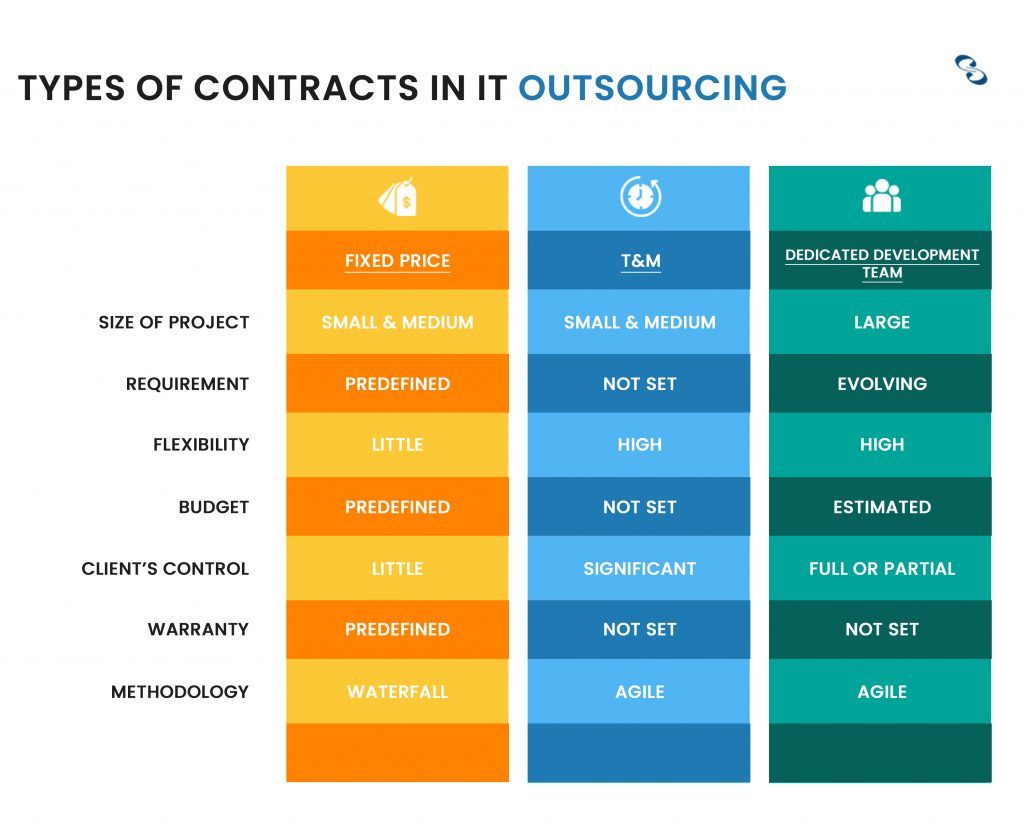
Full-Time Team Model or Dedicated Team Model
In the full-time Team Model, in addition to the management costs, the customer also pays a fixed monthly salary to the experts hired during the entire project process.
This type of cooperation is not only suitable for long-term projects with unclear requirements but also for large-scale internal projects where the client’s employees do not have certain skills.
- Top Advantage– The client can fully control his professional team and workload. Since the supplier is responsible for all recruitment and management, you can focus all your attention on the business aspects of the project.
- Top Disadvantage– The lack of well-formed specifications brings a lot of creativity to remote teams, which can lead to discrepancies between customer expectations and the end result. You can use these experiments with leading software providers.
Also Read | Business Analyst Interview
Fixed-price
The fixed model accepts that both of the project parties agree ahead of time on the determinations, the extent of the project, obviously the cost, and lastly the name. Since customization is not possible, this template is best suited for small projects.
- Top Advantage– FP is ideal when you are trying things out with another software service. You will get what you want, within your range.
- Top Disadvantage– Since the timing is negotiated in advance, the likelihood that the project will be delivered on time is higher. The FP model leaves no room for change, making it extremely difficult to manage risk.
Time and material
Through the Time&Material model, customers pay for the time dedicated to development. This model is most suitable for small and medium-sized projects that do not have predefined requirements.
It is also ideal for projects that require limited resources (1-3 resources). Since the original specifications are not defined, customers can quickly change the work plan as needed. Therefore, T&M perfectly matches various agile methodologies.
- Top Advantage– Thanks to the implementation of flexible methodologies, the customer can see all stages of development. This improves the probability that the final product will meet the customer’s demand.
- Top Disadvantage– Uncertain necessities make planning troublesome. T&M expects there will be a lot of communication throughout the project, which slows down the process.
How to Set Up Your Outsourcing Strategy?
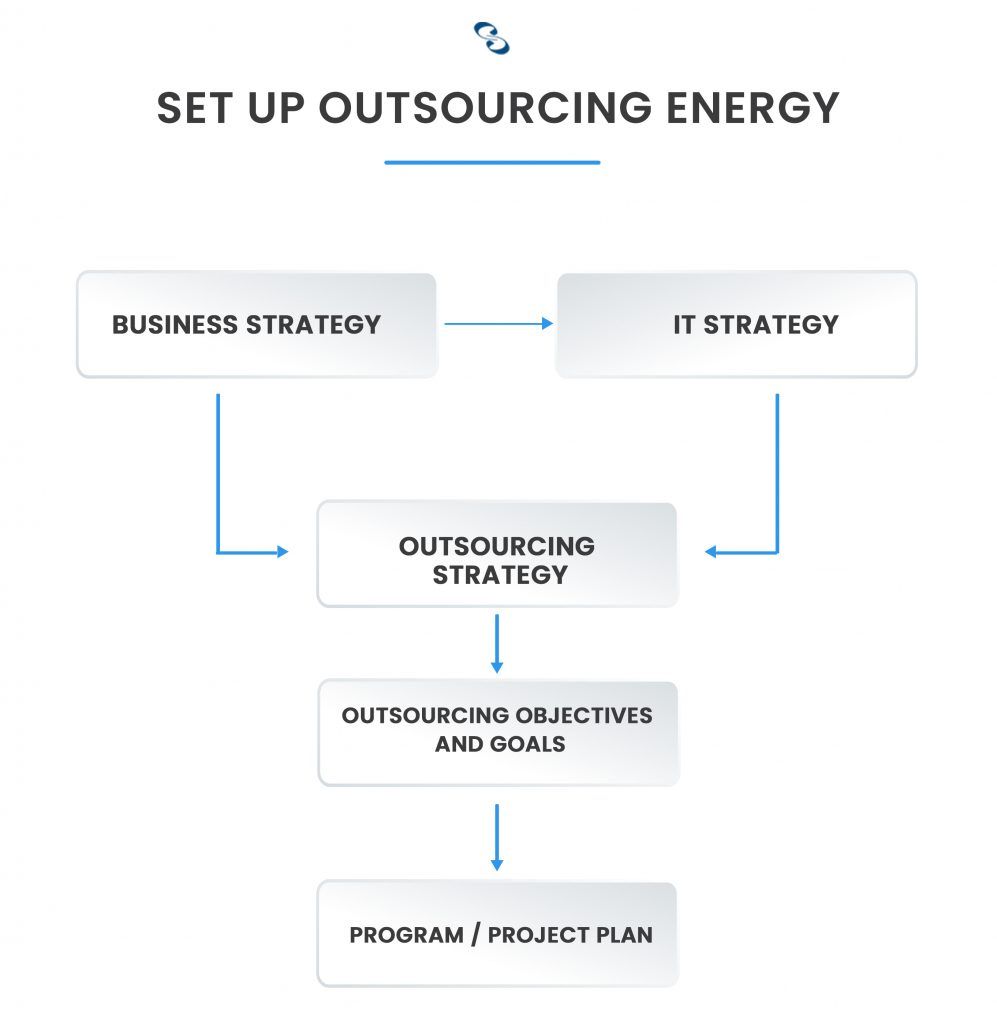
To a company’s owner or a construction foreman, the realization that “You cannot do it all yourself” is a moment of growth.
Saving costs, saving time, and increasing quality are all compelling reasons to outsource your software development projects. But it is important to know how to set up an outsourcing program in order to maximize these benefits.
Also Read | NodeJS Learning Path
Outsourcing software development is a work that will be of interest to both startups and multinational corporations.
In case you’re not aware, outsourced software development can provide many benefits, such as boosting the productivity of your employees without experiencing spikes in production intensity, improving product quality, or saving on costly web developers.
Outsourced programming is a common practice for software development and technical communities. Now let us understand, What does it take to set up and implement your outsourcing strategy?
These are some of the steps to guide you through implementing your outsourcing strategy:
- Reducing costs for business can help– Cost reduction is a common reason for outsourcing, but this is not the only reason for doing so:
Don’t look for suppliers based on price alone. Utilizing advanced technology, simplifying processes, and reducing business expansion risks are other benefits of outsourcing. Your goals should be realistic, balanced, and achievable.
- Determine the right requirement– Although some companies are known for their excellent coding, others provide excellent consulting services.
In order to find the perfect outsourcing solution, it is important to determine exactly what activities you want to outsource.
Tip: At the beginning of your outsourcing journey, delegate activities that are less important to you.
- Maintain a technology pact profile – Since outsourcing software development is usually done in a remote configuration, it is imperative that your vendor has a technology profile that suits your needs.
To this end, we recommend that you make a list of the resources required for your project. Also, don’t forget about security and data protection features, as data loss is not uncommon.
- Promote good relationships between your staff and freelancers – Inform them of your outsourcing goals, avoid rumors, and eliminate any cultural differences between your team and your supplier’s team. Make sure your business is really ready for change.
How is Software Development Usually Done?
Are you curious about the process of software development?
Software development is not an intangible process. More programmers are managing their own projects by using revision control systems (e.g., Subversion, Git) rather than wrestling to upgrade legacy systems that are difficult to maintain.
Also Read | Vulnerabilities In Android Applications
When you have a good plan for your development, then things are clear-cut and less costly in the long run.
Planning software development can seem complicated, but it doesn’t have to be. We examine the different steps that are involved in this process- brainstorming, prioritizing features, user experience design, Programming, ongoing tweaks, and improvements.
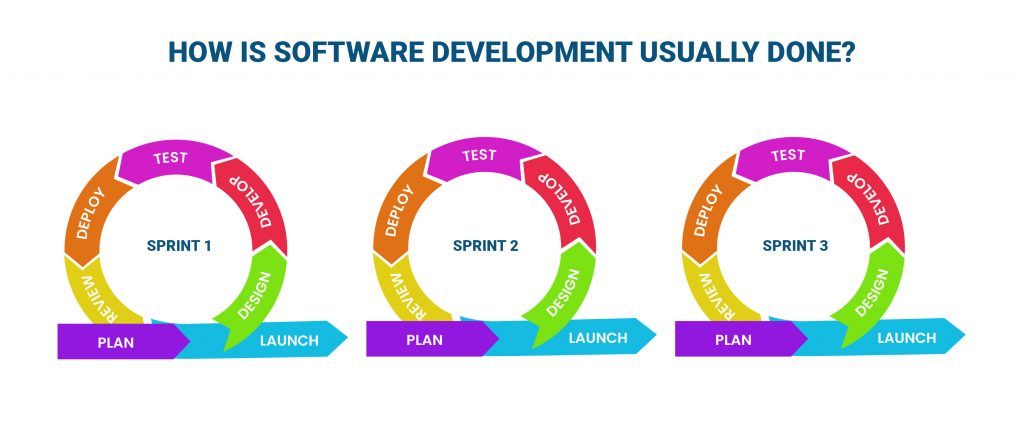
We will also show you how you can harness tools to simplify these tasks for yourself.
Brainstorming
Every project starts with an idea. However, ideas don’t get anywhere. First, you need to identify a business need and then figure out how to implement it.
A key part is to guarantee the accessibility and openness of the necessary development devices, stages, and correspondence channels.
Fundamentally, you need to guarantee ideal handling every day without consuming assets or meddling with the continuous events of development. One more foundation of your prosperity is efficient documentation.
Prioritizing Features
Document consistency at each stage is very important for maintaining proper communication, workflow, accountability, and facilitating communication among team members.
It is energetically suggested that you sum up all that was finished during the Prioritizing stage with a Software Requirements Specification (SRS), a record that states what software is able to do and how it needs to be created.
User Experience Design
Design is the most important component of the life cycle of a software project. The design phase can also involve creating a prototype that visually represents how the design looks and works.
As the basis for the SDLC, this step translates the product design into actual software. While a little venture can be finished by one engineer, for enormous activities all tasks are dispersed among colleagues relying upon their specialized expertise.
Along these lines, the front-end designer makes the UI of the software and its association with the server. Administrating teams add every one of the necessary information to the data set.
Thus, the front-end developer creates the user interface of the product and its connection to the server; database administrators add all the required data to the database.
Programming
It is vital to ensure that the code meets the project requirements and meets the expectations of the stakeholders. It is not surprising that this stage is the longest.
However, if the concept and design have been carried out with the utmost care, this is also the easiest option. The objective of this stage is to make a functioning item and source code.
Analyzing
When the developing stage is finished, it’s the ideal opportunity for the QA specialists to check in the event that it meets every one of the necessities.
After fixing the identified bug, the developers send the software to the QA team for retesting. This process is repeated until the entire product is error-free.
Ongoing Tweaks and Improvements
Once the Analyzing phase is successful and there are no errors or other defects in the product, it will be brought to the market for beta testing.
Also Read | Business Resolution For Prominent Business Success
During Beta testing, the support team will collect user feedback and if something goes wrong, the development team will fix it. Only after the product is finalized according to real reviews, can it finally enter the market.
Its life cycle doesn’t end here: unexpectedly, the item is routinely refreshed to further develop execution and meet the changing requirements of clients.
Where to Outsource, and How Much Does It Cost?
Regional differences in the hourly cost of outsourcing software development make the idea of outsourcing so beneficial for suppliers and so cost-effective for customers.
An analysis of the costs of outsourced software development in Asia shows that hourly rates can be as low as $ 10. Starting this year, the average workforce outsourcing company will charge between $ 50 and $ 1,500 per month.
Of course, this price depends on how many employees you have and how many services you need. To calculate the cost of such an outsourcing team, find out their base salaries and add them up.
When outsourcing, software developer salaries are the only expense you face when building a cross-functional team. If you need an experienced application development team, you can significantly reduce the total project cost through outsourcing.
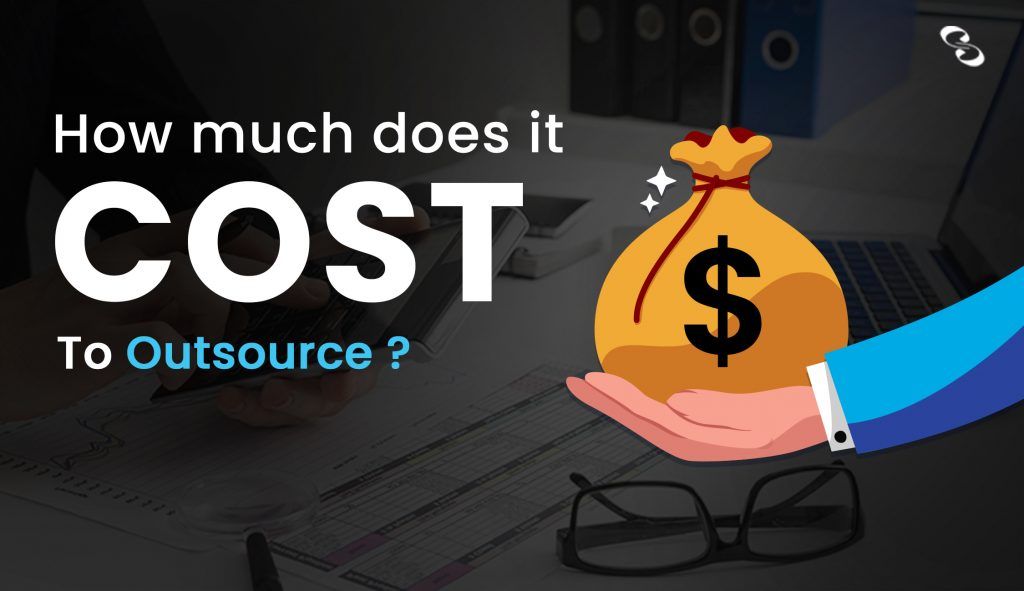
You already know how much it costs to hire developers in different parts of the world, you know where to look for competent specialists, and, in addition, you know which specialists should (or can) participate in the team working on your project.
As you can see, there are many factors that can affect how much you pay for third-party customer service. However, remember that outsourcing is not only a cost, you also need to think about the quality of the service, the timeliness of delivery, and the confidentiality of the company’s information.
Also Read | Fastest Growing SAAS Companies
While some say the outsourcing cost is the amount you pay the seller as per the offer, others are prone to alternative and additional outsourcing costs. In fact, for many companies, the cost of outsourcing is the first thing that comes to mind when planning to outsource Software services or development.
You now know that comparing outsourcing costs to internal development costs is critical to understanding how much you save and how much you can save. Then, you need to determine any internal costs that can be avoided if the business functions are outsourced.
After clearly defining the business function to be outsourced, the next step is to determine and calculate the cost that your organization can avoid if this function is outsourced.
How to Choose a Software Development Vendor?
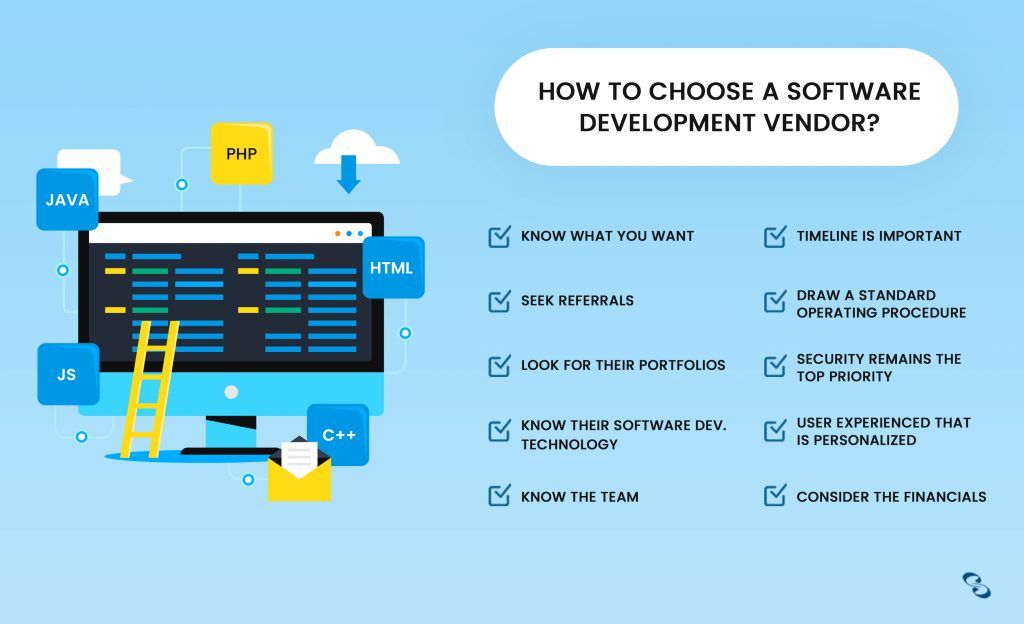
Regardless of whether you are searching for web-developing employees or portable administrations, you should have clear direction on picking a provider that suits your requirements. It takes time and effort to find and select a software development company for your project.
As the number of companies offering software development services increases, you have a lot to choose from. Try to recruit about 3-5 candidates that you consider to be the best software outsourcing companies.
Then, based on the information, you can start looking for a company that will help you succeed in your custom software project. Find out about the experience the company has, especially if you prefer a specific software system. You can follow these important steps:
- Ensure the organization you pick keeps a deliberate connecting process through calls or other connections in your project development.
- It is also helpful to understand how developers work and if there are any tools that can help with planning and progress.
- It may be helpful to ask questions about the implementation of similar systems, possible obstacles, vendor products with the required functions, and the use of appropriate technology.
- Business owners should ask these questions to set internal expectations, define job requirements, and ensure that the supplier understands the business needs and can help you achieve your business goals.
- It’s time to find out whether the supplier has the necessary resources and rich experience in your business lines, processes, possible areas, or customer risks.
- It is good if the vendor is willing to share information about their subject area and best practices to alert you to potential pitfalls and pitfalls for these types of projects.
- In case they accept, they should welcome business examiners to help with drafting the software requirements to guarantee a reliable outcome for the undertaking.
Also Read | Facebook’s Libra Another Crypto- Should You Care?
- Explain whether they give post-development, customization, programming customization, re-check services, and support administrations. They will make it simpler to work with them knowing what you are getting and what your assumptions for the work will be.
- If they’re okay with them, you can rest assured that you will end up with special software that speeds up your business and delivers top-notch customer service.
- Prior to beginning a partnership with a particular provider, ensure the organization has active involvement in comparable undertakings in your industry. For instance, in some information-concentrated areas, it is significant that the outsourcing service provider has applicable experience.
Note- however, that development firm might charge a permit expense for their software, yearly help costs, or incorporate equipment charges, outsider charges, and so on.
Assuming that you pick a level rate, most programming organizations will add 25% or more to cover the danger of not knowing the specific extent of the project.
Your main aim is to will observe an organization that will increase the value of your interior group. Finding a software development company with the experience and methodology for managing your specific project will help you a lot.
Software Development Outsourcing Contract Details
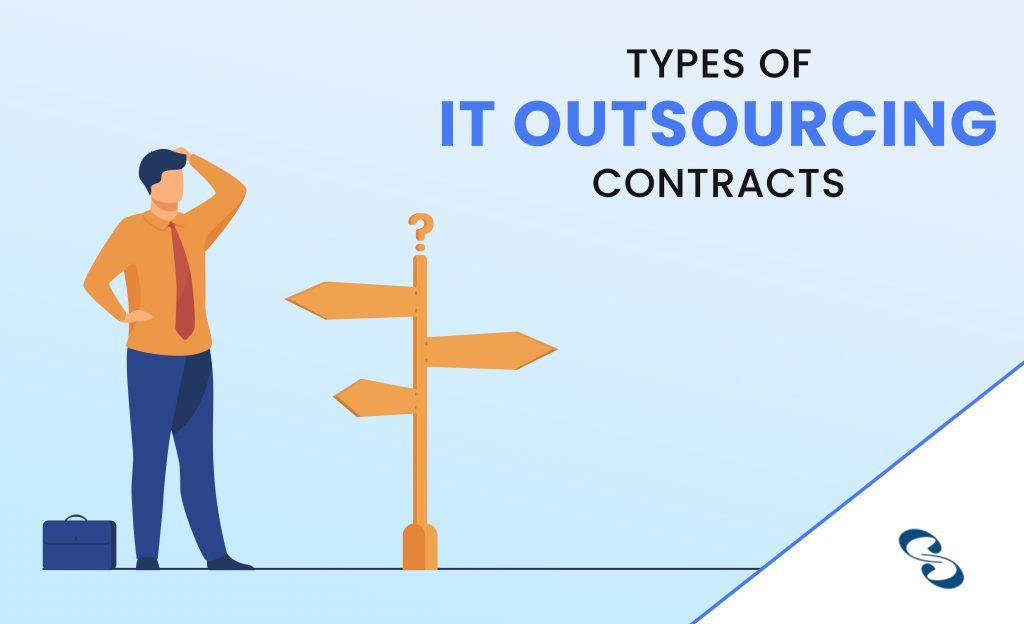
When managing your company’s operations, it is only natural that you will want to find the best way to manage them in order to save time and money.
Outsourcing many of the tasks that do not contribute to the core aspects of your business is a great way to make this happen.
However, before employing any outsourced workforce, there are certain documents needed in order to be legally binding with an outsourcing company, and one of these is a software development outsourcing contract.
These contracts might include confidentiality clauses for developers. Confidentiality Developers must not :
- Disclose to third parties the customer’s business, and software-related details, including information about the software code, specifications, or customer’s business.
- Duplicate any secret data or any substance depending on the ideas contained in private data for individual use or dissemination, except if mentioned by the client.
- Use of confidential information, if not solely for the benefit of the customer. Developers will not disclose customers’ business, or software-related details to third parties, including but not limited to any information about software code, specifications, or customer’s business.
The development and delivery of software under this agreement do not violate any other agreement between the developer and another party.
The customer may terminate this Software Development Agreement at any time in the event of a material violation of the terms and conditions contained therein and the failure to remedy such violation within [time] of the notification of such violation.
Also Read | Programming Languages For Jobs And Future
Things Developers need to follow after signing a contract:
- The Client, therefore, embraces that the Developer consents to get approval from the Client to foster the Software as per the particulars joined to this document.
- The designer is a worker for hire with whom the Customer has gone into consent to foster the Software together.
Remember that the whole purpose of the contract is for both the customer and the software developer to understand all the details of what needs to be agreed upon before service can be provided.
This means that the contract must spell out everything from who will be involved in the transaction to what the customer expects from the contractor. This means that the agreement must detail everything from the parties involved in the transaction to the expectations of the contractor’s customers.
If the document contains all the necessary information, you can be sure that all the model agreements related to the transaction between the parties are understood and approved.
Relevant as an Outsourcing Partner
Outsourcing is not new, but the market of outsourced services has transformed significantly with the rise of the digital era.
What was once an easy process, has become the complex task of vetting prospective partners. The need for reliable, trustworthy partners has opened up new possibilities for businesses to outsource various functions of their business operations.
If you’ve been looking for a reliable outsourcing partner, then we understand that finding one is quite a task. You may be feeling discouraged and even sceptical that the search is fruitless and that you’ll never find the perfect match with whom to collaborate.
Consider how we can help provide your company by freeing up your time and enabling you to focus on other aspects of your business that are most important to you.
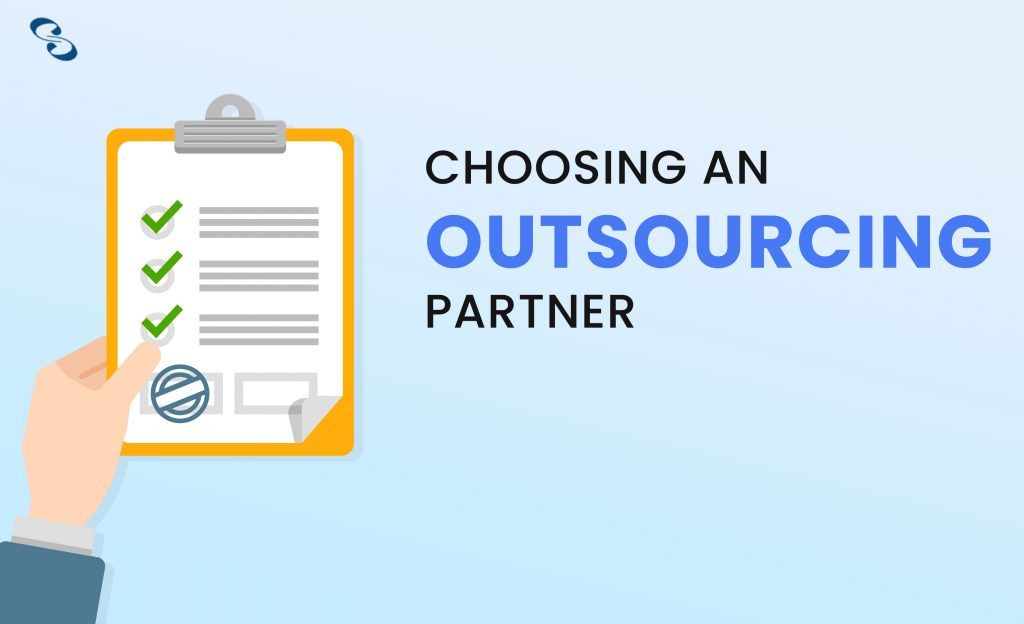
Organizations regularly decide to outsource their help capacities to focus on their inward assets in their center business.
Given these benefits, organizations regularly decide to outsource by generating capacities inside their business to focus their assets all the more directly on their center capabilities, accordingly assisting them with acquiring an upper hand in the commercial center.
When outsourcing services to an overseas company, the goal is to gain access to a better workforce that can run your business from a different perspective and is identified as a game-changer in business.
So that the company can effectively transfer roles and responsibilities to outsourcing; It is important to focus on business partnerships as much as on logistics. How Outsourcing Works at a request for an organization to successfully complete responsibilities, focuses on business associations just as logistics.
Outsourcing is a long-term relationship, so choosing the right partner is critical to achieving your business, financial, and technology goals. The main aim of an outsourcing collaboration is the capacity to get profit from your accomplice’s abilities and experience.
Therefore, they can choose the best technology for you to create a competitive product, provide free business advice, and even offer ideas on how to make your software more cost-effective.
Vendor IT and advanced technology expertise are probably one of the reasons you considered outsourcing in the first place.
When choosing an outsourcing service provider, one of the most important points to consider is the quality and skill level of the human resources that will be provided to you. You can’t expect outsourced employees to be as familiar with your business as your internal team.
For an outsourcing company, it is important to know that you understand the level of service and quality that a reputable company provides to its customers, and that you want to get the most benefit from them.
In A Nutshell
Typically, most outsourcing providers post reviews on the homepage or in the case studies section. Google for “review [company name]” to find objective opinions of current or past customer buyers on third-party websites.
For outsourcing suppliers, it is very important to understand and respect your patents and intellectual property rights. Understanding the goals of an outsourcing partner can help you determine whether that particular offshore partner is suitable for your business.
Sharing the business vision and working, in the same way, will help expand the relationship with your outsourcing partner.
After all, a successful outsourcing partnership isn’t just about your servers and workstations; it concerns the entire company, the inevitable changes it faces, and its vision for the future.
Successful outsourcing requires process management savvy and a strong ability to apply technology to solve business problems. We believe that this article from CoderSera might have helped you with your software development outsourcing needs.
FAQ
Q1. Which SDLC phase is performed with both internal software development and outsourcing?
Ans- The testing stage and the underlying SDLC stages can be performed with both outsourcing and software development, as they require end-client cooperation.
Q2. What is software development outsourcing?
Ans- Software Development Outsourcing depicts a game plan, wherein an association decides to employ an outside development office to adequately complete every one of the tasks of the project.
